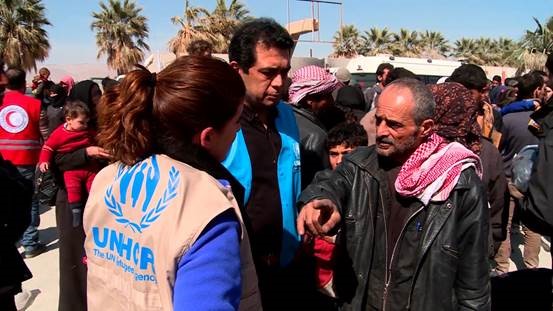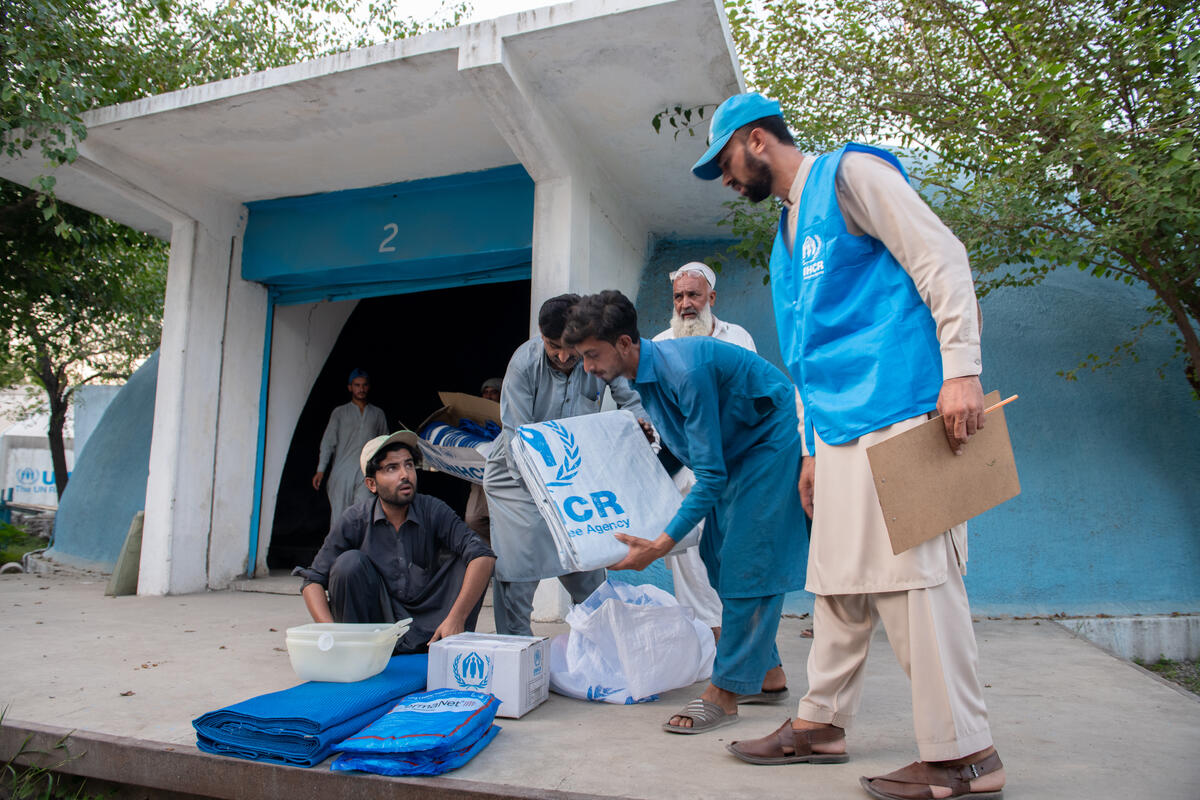Fierce fighting in Eastern Ghouta, rural Damascus, and Afrin causes massive new displacement of Syrian civilians
Fierce fighting in Eastern Ghouta, rural Damascus, and Afrin causes massive new displacement of Syrian civilians

UNHCR, the UN refugee agency, is alarmed by a further deepening of the humanitarian crisis in Syria as fierce fighting in Eastern Ghouta, rural Damascus and Afrin in the country’s northwest causes massive new displacement.
In Eastern Ghouta alone, more than 45,000 Syrians have fled their homes in recent days. UNHCR is responding to urgent humanitarian needs on the ground, but we are today reiterating our call for the protection and safety of both the newly displaced and of hundreds of thousands civilians, still trapped by fierce fighting and in dire need of aid.
UNHCR takes no part in the current evacuation deal or in its implementation. But from the outset of the most recent escalation, our teams have been at the makeshift collective shelters as thousands of families, exhausted, hungry, thirsty, and sick and with few or no belongings were arriving from Eastern Ghouta. More civilians continue to make their way out every day.
The newly displaced are currently accommodated in Dweir, Adra Schools, Adra Electricity department, Herjelleh, Najha, Nashabiya, Khirbet al Ward, where conditions are miserable. According to UNHCR staff, the needs are overwhelming and growing by the hour. There are also serious health risks.
All existing shelters are extremely congested and overcrowded and lack basic sanitation. People queue in lines for hours to use restrooms, and most have no lighting. UNHCR and its partners have been working around the clock to provide life-saving assistance. This is in close coordination with the Syrian Arab Red Crescent (SARC), UN agencies and other humanitarian actors.
UNHCR’s partners are registering persons lacking documents, particularly unregistered newborn children, with a view to tackle this major protection concern with the Syrian authorities.
UNHCR has so far delivered 180,000 core relief items to meet the urgent needs (mattresses, blankets, high thermal blankets, plastic sheets, winter clothes kits, solar lamps, jerry cans, and kitchen sets). At several collective shelters, people living in the open in schoolyards are desperate and using UNHCR’s blankets as partitions to create some privacy, and to protect themselves and their families from the sun in daytime, and from the cold at night.
The shortage of appropriate shelter is a major concern and we are striving to bridge this gap. More than 2,200 shelters kits had been provided to SARC to make the facilities allocated for collective shelters habitable. Some 800 UNHCR family tents have been dispatched from northeast Syria and will reach Damascus within the next 48 hours. More tents will be brought but in the meantime UNHCR is also dispatching several rubb halls to be used as temporary shelter for people sleeping in the open, particularly at collective shelters.
Full and unhindered humanitarian access to civilians inside and outside Eastern Ghouta, in collective shelters and elsewhere is crucial to ensure the urgent needs of civilians are met.
Equally important is full respect of the civilians’ freedom of movement and choice of place where they feel safe. They must be allowed and guaranteed the right of choice to remain in Eastern Ghouta or seek safety elsewhere. UNHCR is aware of, but has no access to security screening reportedly taking place as civilians leave Eastern Ghouta.
UNHCR call on all parties to respect international humanitarian law and human rights law in the treatment of civilians both in and fleeing Eastern Ghouta.
Meanwhile, another emergency is unfolding in the northwest of Syria where an estimated 104,000 people have been uprooted from their homes in Afrin region by the latest escalation in fighting. The majority, some 75,000, are displaced in Tal Rifaat, while another 29,000 have sought safety in Nubol and Zahraa and surrounding villages in northern rural Aleppo. In addition, some 10,000 people are reportedly stranded at Az-Ziyara, attempting to no avail to cross into areas controlled by the Syrian government.
A UNHCR team was on the ground in Nubol yesterday where they heard stories of their exhausting journey, walking long hours through the mountains. They also witnessed the crowded conditions at the schools and mosques where the newly displaced people from Afrin are sheltered.
In the face of the growing Afrin emergency, UNHCR has scaled up its response, with 100,000 core relief items having been delivered in the last two days. These include matrasses, blankets, high-thermal blankets, plastic sheets, solar lamps, jerry cans, clothes, and other basic aid items. Also, 1,100 shelter kits have been dispatched, and 1,000 tents are expected to reach Tal Rifaat in the coming days.
As in Eastern Ghouta, freedom of movement for newly displaced from Afrin is essential. We urge safe and prompt passage towards Aleppo and other destinations where many of the displaced say they have relatives, friends or other properties.
For more information on this topic, please contact:
- In Amman, Rula Amin, aminr@unhcr.org, +962 (0)790 04 58 49
- In Syria, Mysa Mohammad Ali Khalaf, khalafm@unhcr.org, +963 9933 57860
- In Geneva, Andrej Mahecic, mahecic@unhcr.org, +41 79 642 97 09









